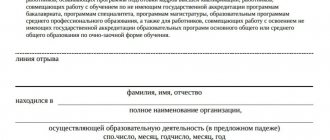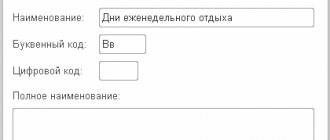How long can there be between holidays?
Important: Organize your care wisely. 14 days before your vacation you need to: Find someone who can replace you, who will check your email and make decisions on work issues for you. To ensure everything goes smoothly while you're away, take the time to hand over things to your colleague and get him up to speed. Make a list of unfinished tasks; the most important ones are best resolved before departure. For the rest, be sure to leave instructions with your colleagues to avoid alarm bells during your travels. Sort through your email and check if you missed anything important. We recommend reading Comments No comments...
Vacation and dismissal
Upon dismissal, monetary compensation for vacation is due to everyone and for all vacation periods, regardless of their duration. You can also take off all unused vacation periods with subsequent dismissal, if it is not a consequence of guilty actions. Leave with further dismissal is given based on the results of a statement written by the employee and a subsequent order issued.
The last day of vacation will be the day of dismissal, and the last working day will be the working day before the vacation. You can also withdraw your application if the vacation period has not begun and you have not had time to invite a new employee to the vacant job in the near future. In case of illness that overtakes a person during vacation, he is entitled to paid sick leave.
Interval between holidays. vacation interval (lime gap between issues)
Pravoved.RU 484 lawyers are now on the site
- Labor law
- Protection of workers' rights
Hello, please tell me. What is the period of time between vacations? For example, I was on vacation in August, can I now take a full vacation Collapse Victoria Dymova Support employee Pravoved.ru Similar questions have already been considered, try looking here:
- For what period of unused vacation should I receive compensation upon dismissal?
- For what period will the calculation of average earnings be considered?
Lawyers' answers (2)
- All legal services in Moscow Wage collection Moscow from 30,000 rubles. Assistance in reinstatement at work Moscow from 40,000 rubles.
Is it legal to call a person back from vacation?
Only by agreement with the employee can he be called back from vacation. In this case, unused annual leave is granted at any other suitable time in the current or subsequent working year. If an employee refuses to interrupt his rest, his refusal should not be correlated with a violation of labor discipline.
It is strictly forbidden to recall from vacation citizens under the age of majority, employees working in conditions harmful or dangerous to life and health, and pregnant women. Even if the review is related to their direct expression of will.
What break should there be between vacations?
The New Year holidays are approaching, and in this regard, as always, questions arise - how and how much Russians will rest at the beginning of next year.
What is the legal interval between holidays? The first one can be taken after 6 months of work in the company. Subsequent vacations are provided in accordance with the agreed vacation schedule, which is approved by the organization at the end of each year, and this schedule is mandatory for both the employer and the employee. Changes are permitted by mutual agreement. The minimum interval between parts of vacation is not regulated by law. Alex Profi (738) 2 years ago 6 months, according to the laws of the Russian Federation Svetlana Ivanova Thinker (9129) 2 years ago Yes, even the next day.
Is it justified to extend or postpone the vacation to another time?
While on sick leave or performing government duties during the vacation period, vacation (by agreement with the employee) must be extended or postponed to another time. If such grounds arise, the employee should notify management about the situation in order to extend the vacation period by the required number of days.
If the 14-day notice period for an employee going on vacation is not met, the employer is required by law to reschedule the employee’s vacation to another time. To do this, you only need a written statement from the employee. A similar situation is possible if vacation pay is not paid on time, which should be received by the employee within three days.
In cases in which the provision of annual paid leave this year may have a negative impact on the productivity of the organization or enterprise, it is possible for the employee to transfer the rest period to another time in the next working year. It is important that the leave is taken within a year of the end date of the previous working year.
The employer's representative does not have the right to refuse to provide vacation days to an employee for two years in a row. It is impossible not to provide leave to minor citizens and people working in dangerous or harmful working conditions, even if people are ready to work without rest.
Working time is the time during which an employee, in accordance with internal labor regulations and the terms of the employment contract, must perform labor duties, as well as other periods of time that, in accordance with the Labor Code of the Russian Federation, other federal laws and other regulatory legal acts of the Russian Federation, relate to working hours time (Article 91 of the Labor Code of the Russian Federation).
Other periods that, in accordance with the Labor Code of the Russian Federation, other federal laws and other regulatory legal acts of the Russian Federation relate to working time, are considered idle periods, breaks for heating and rest, breaks for feeding a child, time spent on a business trip, time between shifts for rest during the period being on watch.
Normal working hours cannot exceed 40 hours per week. The normal duration cannot be changed by other regulations or agreement of the parties.
Local regulations may establish working hours for employees. At the same time, it must be remembered that collective agreements, agreements, and employment contracts cannot contain conditions that reduce the level of guarantees for workers in comparison with those established by labor legislation and other regulatory legal acts containing labor law norms. If such conditions are included in a collective agreement, agreement or employment contract, then they are not subject to application (Part 2 of Article 9 of the Labor Code of the Russian Federation).
State authorities of the constituent entities of the Russian Federation may adopt laws and other regulatory legal acts containing labor law norms on issues not falling under the jurisdiction of federal state authorities. At the same time, a law or other regulatory legal act of a constituent entity of the Russian Federation containing labor law norms should not reduce the level of labor rights and guarantees for employees established by the Labor Code of the Russian Federation or other federal laws.
Labor legislation establishes the following types of working hours:
- normal working hours;
- reduced working hours;
- part-time work.
Normal working hours are the duration of working hours applied if the work is performed under normal working conditions and the persons performing it do not require special labor protection measures. Article 91 of the Labor Code defines the limit of normal working time at 40 hours per week.
Within these limits, the normal working hours are established by collective agreements and agreements. In cases where a collective agreement was not concluded or a condition on the duration of work was not included in the collective agreement, the maximum norm established by law - 40 hours per week - applies as the real standard of working time.
Shortened working hours mean working hours reduced compared to normal, when the reduction is carried out in accordance with the law or a collective agreement.
for workers under the age of sixteen - no more than 24 hours a week;
for workers aged sixteen to eighteen years - no more than 35 hours per week;
for employees who are disabled people of group I or II - no more than 35 hours per week;
for workers engaged in work with harmful and (or) dangerous working conditions - no more than 36 hours a week in the manner established by the Government of the Russian Federation, taking into account the opinion of the Russian Tripartite Commission for the Regulation of Social and Labor Relations.
Until the corresponding legal act of the Government of the Russian Federation is adopted, the List of production facilities, workshops, professions and positions with hazardous working conditions, approved by the Resolution of the State Committee of Labor of the USSR and the Presidium of the All-Union Central Council of Trade Unions of October 25, 1974 N 298/P-22, is in effect, work in which gives the right to additional leave and shortened working hours20.
All employees whose professions and positions are provided for in production and workshops in the relevant sections of the List, regardless of industry, have the right to a shortened working day. The right to a shortened working day or working time arises only if the employee actually performed work in hazardous conditions for a duration of at least half the working day established by the List for a given production, workshop, profession or position.
The Labor Code of the Russian Federation and other federal laws may establish reduced working hours for other categories of workers (teaching, medical and other workers). The employer has the right, at his own expense, to establish a shortened working week for other categories of employees.
Thus, establishing reduced working hours is the responsibility of the employer. When concluding an employment contract, the parties do not have the right to increase the working hours established by law.
We invite you to read: What payments are due upon the death of a relative
Unlike reduced working hours, part-time working hours can be established by agreement between the employee and the employer, both upon hiring and subsequently.
Part-time working time is working time whose duration is less than normal. In the event that an employee, in accordance with the law, has the right to reduced working hours, time of shorter duration compared to the corresponding standard of reduced working hours will be considered incomplete.
At the same time, the employer is obliged to establish a part-time or part-time work week at the request of a pregnant woman, one of the parents (guardian, trustee) with a child under the age of 14 (a disabled child under the age of 18), as well as a person caring for a sick family member in accordance with a medical certificate issued in the manner established by federal laws.
Part-time work does not entail for employees any restrictions on the duration of the annual basic paid leave, calculation of length of service and other rights. At the same time, the employee is deprived of the right to additional leave provided for in Article 116 of the Labor Code of the Russian Federation if he is assigned a part-time working day. If he is assigned a part-time working week, then the right to the specified additional leave is not lost.
Loading page
Federal Law No. 90-FZ) In exceptional cases, when the provision of leave to an employee in the current working year may adversely affect the normal course of work of an organization or individual entrepreneur, it is allowed, with the consent of the employee, to transfer the leave to the next working year. In this case, the leave must be used no later than 12 months after the end of the working year for which it is granted.
(edited)
Federal Law No. 90-FZ) Failure to provide annual paid leave for two years in a row is prohibited, as well as failure to provide annual paid leave to employees under the age of eighteen and employees engaged in work with harmful and (or) dangerous working conditions. Article 125. Division of annual paid leave into parts.
The interval between holidays according to the labor code
Code and other federal laws. The procedure and conditions for granting these leaves are determined by collective agreements or local regulations, which are adopted taking into account the opinion of the elected body of the primary trade union organization. (as amended by Federal Law No. 90-FZ of June 30, 2006) Article 117. Annual additional paid leave for employees engaged in work with harmful and (or) dangerous working conditions Annual additional paid leave is provided to employees engaged in work with hazardous and ( or) hazardous working conditions: in underground mining and open-pit mining in open-pit mines and quarries, in zones of radioactive contamination, in other work associated with the adverse effects on human health of harmful physical, chemical, biological and other factors. (edited)
This is important to know: If an employee went on sick leave before a vacation, is the vacation transferred?
Chapter 19. vacations
Federal Law) Part of the annual paid leave exceeding 28 calendar days, upon the written application of the employee, can be replaced by monetary compensation. When summing up annual paid leave or transferring annual paid leave to the next working year, monetary compensation can be replaced by a part of each annual paid leave exceeding 28 calendar days, or any number of days from this part. It is not allowed to replace with monetary compensation annual basic paid leave and annual additional paid leave for pregnant women and employees under the age of eighteen, as well as annual additional paid leave for employees engaged in work with harmful and (or) dangerous working conditions, for work in appropriate conditions (with the exception of payment of monetary compensation for unused vacation upon dismissal). Withdrawal from leave By agreement between the employee and the employer, annual paid leave may be divided into parts. Moreover, at least one part of this leave must be at least 14 calendar days. Attention, recalling an employee from vacation is allowed only with his consent. The part of the vacation unused in this regard must be provided at the employee’s choice at a time convenient for him during the current working year or added to the vacation for the next working year. Employees under the age of eighteen, pregnant women and employees engaged in work with harmful and (or) dangerous working conditions are not allowed to be recalled from vacation. Article 126. Replacement of annual paid leave with monetary compensation (as amended
Rules for splitting rest
The annual paid rest of any employee cannot be less than 28 calendar days (Article 115 of the Labor Code of the Russian Federation). Intracompany orders are illegal if they establish the opposite. They can increase the duration of vacation, but not reduce it. Regulates the division of vacation into parts - the Labor Code of the Russian Federation.
The employee has the right to agree on the time of vacation with the manager. In this case, at least one segment must be at least 14 calendar days (Article 125 of the Labor Code of the Russian Federation). The rest of the period can be taken off as you wish. The Labor Code of the Russian Federation does not prohibit an employee from taking vacation even one day at a time or taking all the rest at once, taking them out on the weekend, although all this is usually not welcome. Also see "Annual Paid Leave".
Long rest allows the employee to rest, recover, and gain strength. The duration of leave may be increased by federal or internal regulations. Keep in mind: the latter cannot reduce the minimum number of vacation days, even if they are signed by the employee himself.
Vacation splitting can occur at the initiative of an employee or manager. At the same time, the employee does not need to obtain consent from the employer. But the division of leave into parts proposed by the director must occur with the permission of the employee.
Thus, internal regulations cannot determine the minimum number of vacation days. In addition, the employee chooses for himself how many parts to split the 14 days of his vacation.
If the employee has already taken two weeks off, dividing them, then the manager does not have the right to call the employee for the remaining part of the time: after all, this will violate the requirement of labor legislation that it is impossible to break at least 14 vacation days. Also see “Recalling an employee from vacation.”
In order not to violate the employee’s rights, the employer must agree on the division of annual leave with his subordinates. The result of negotiations should be reflected in writing. This can be done in two ways (see table).
| № | Way | Who is it convenient for? |
| 1 | The employee submits an application to the employer about the desire to divide the vacation into several parts. | This option is used in organizations with a small number of employees. It is the most reliable and logical. |
| 2 | Draw up a vacation schedule containing data on the division of employee vacations and provide it for review by employees. They put their signatures in a special column of this document, expressing their agreement with the specified conditions. | This method is used by organizations with a large number of employees. |
Not every production and not every other organization has the opportunity to send its employees on continuous rest. Therefore, dividing annual leave into parts becomes the only way to avoid losses for the company.
Please note: if an employee does not agree to this procedure, the employer has no right to oblige him. The decision to split up rest cannot be made solely by the manager. This contradicts the letter of Rostrud dated July 17, 2009 No. 2143-6-1.
The employee can dispose of the vacation at his own discretion: take it all at once. This means that the division of paid leave is not a mandatory procedure.
We suggest you read: What to do if a neighbor occupied part of the land plot
A manager, wanting to split up an employee’s vacation, must convince him and not force him. The fact is that for this Code of Administrative Offenses of the Russian Federation (Part 1 of Article 5.27) the amount of fines for committing such an offense is fixed. Responsibility may be incurred by:
- directly heads of enterprises or businessmen (from 1 to 5 thousand rubles);
- legal entities, that is, organizations as a whole (from 30 to 50 thousand rubles).
Sometimes, through internal documents, employees are required to divide the second part of their vacation into several periods. In this regard, keep in mind: this provision violates the rights of workers and is illegal. It is prohibited to apply such local acts in practice due to their inconsistency with the provisions of the Labor Code.
If an employee is faced with an internal rule that infringes on his rights, he can refuse to comply with it. If a conflict arises with the manager, the employee should contact the labor inspectorate. Employees of this service will check the internal acts of the enterprise, report their illegality to the director of the organization and oblige to correct the situation.
The Labor Code does not regulate how an employee can use the division of basic leave. The employee draws up the application independently. As vacation days he can take:
- work days;
- working days and weekends;
- weekend.
Depending on this, the actual duration of the vacation may vary. The following situations are possible here (see table).
| № | What's in the application | What about vacation pay? |
| 1 | The employee wrote a statement for the entire week - from August 1 to August 7, 2016. The period covers weekdays and weekends. | The manager pays vacation pay for all seven days. This option occurs in most cases. It does not raise any controversy or questions. |
| 2 | The application was written by an employee for the period from August 1 to August 5, 2016. It includes five working days. This situation is possible. | An employer cannot oblige an employee to correct the August 7 end date. Vacation pay is paid only for the specified period, and August 6 and 7 are considered days off. Because of this, the actual vacation period is increased by two days. |
| 3 | The application was written by the employee on August 6 and 7, 2020. These days are days off | This type of vacation is not beneficial for the employee. Even without this, he has the right to take days off. Vacation pay is paid for August 6 and 7. |
Note that if an employee constantly postpones his vacation to weekends, this may raise questions from the inspection authorities. Although if you use such leave once a year, there should be no complaints. Also see “If the vacation coincides with the holidays.”
Russian enterprises practice the use of short vacations by their employees that coincide with weekends. So, the employee takes the first part of the main rest off continuously - for at least 14 days, and splits the rest into 7 parts of 2 days each, falling on weekends.
The Labor Code allows the employee to divide the second 14 days of vacation at his own discretion, if the manager agrees to this. Moreover: taking exclusively weekends as vacations is not against the law. Vacation can begin and end with a day off.
In reality, such a scheme cannot be used, because the employee does not work on weekends without vacation. In fact, he doesn't take vacations. Art. 107 of the Labor Code of the Russian Federation establishes that types of recreation include:
- breaks during the day;
- rest between shifts;
- weekend;
- public holidays;
- vacation.
By taking vacation on weekends, an employee deprives himself of legal rest. Even if the employee brought such a statement, an order to divide the leave into parts should not be drawn up, so as not to violate the employee’s rights. The employee needs to be told about his rights and convinced to take a vacation in a different way.
We invite you to familiarize yourself with: International legal acts regulating family relations
In some cases, an employee may qualify not only for main rest, but also for additional rest. Together they constitute an annual vacation with payment and duration of more than 28 calendar days. Art. 125 of the Labor Code of the Russian Federation provides for the possibility of splitting the holiday. This means that additional rest can be divided into several parts. Also see “Additional leave for hazardous working conditions in 2016.”
An indirect confirmation of the legality of splitting additional leave is the opportunity to receive monetary compensation for it (Article 127 of the Labor Code of the Russian Federation), and not to take all the required days off. Also see “Compensation for unused vacation”.
If you find an error, please highlight a piece of text and press Ctrl Enter.
Minimum break between holidays
Info
User menu aradzion Answer: interval between vacations That is, if the employee took a vacation, for example in January 2006. he can go on his next vacation in February 2007. User menu UliYa status: accounting master Answer: interval between vacations User menu fantazy Answer: interval between vacations What is the period of work between regular annual vacations? It is calculated from the date of hiring.
Important
You can take your second vacation at any time during your working year, but you take it in advance. The employee has the right to the first vacation 6 months after employment.
Attention
Subsequent leaves can be granted at any time in accordance with the organization's vacation schedules. Article 122 of the Labor Code of the Russian Federation Procedure for granting annual paid leave Paid leave must be provided to the employee annually.
After completing the application
After the employee writes an application to replace a colleague during the vacation, a corresponding additional agreement to the employment contract is drawn up between him and the organization’s management.
Subsequently, based on the application, an order is issued on behalf of the director, which indicates the name of the position to be replaced, the period of replacement and all its conditions, and also appoints a responsible person.
After the issuance of this order, the employee can begin to perform replacement labor duties, and when the replacement period expires, he is obliged to return to performing only those labor functions that are specified in his employment contract.
What you need to know about annual leave
Federal Law No. 90-FZ) temporary disability of an employee; the employee performs state duties during his annual paid leave, if the labor legislation provides for exemption from work for this purpose; (as amended by Federal Law No. 90-FZ) in other cases provided for by labor legislation and local regulations. (as amended by Federal Law No. 90-FZ) If the employee was not paid in a timely manner for the duration of the annual paid leave or the employee was warned about the start time of this leave later than two weeks before it began, then the employer, upon the written application of the employee, is obliged to postpone annual paid leave for another period agreed with the employee. (part two in ed.
Document structure and form
Labor legislation does not provide for a single form (unified form) for such orders. The document is written by the director in free form and contains the following points:
- Indication of the reason for publication (for example, in connection with my departure during the annual vacation period, I order).
- The main order for subordinates, directly indicating a temporary deputy or part-time worker (his last name, first name, patronymic and position are entered).
- This paragraph also stipulates all the main nuances of substitution. For example, that the employee is not relieved of his main job responsibilities or, on the contrary, is exclusively engaged in the management of the enterprise or organization.
- If we are talking about combination, in the next paragraph of the order the director indicates the amount of additional payment to the employee’s basic salary.
- In the third paragraph, the deputy is given the right to maintain and sign financial, including banking, and business documentation. If the director decides to grant only part of the powers, he must clearly limit them in this paragraph in order to avoid discrepancies (for example, prohibit signing certain bank documents).
- If, during the absence of the director, the deputy has to represent the interests of the organization or enterprise before third parties, in a separate paragraph he is given full powers to do so (for example, I authorize him to represent the interests of the enterprise before third parties).
According to Article 151 of the Labor Code, the amount of additional payment in case of combination is not limited by any limits, that is, the director can set any amount of additional payment according to the financial capabilities of the enterprise or organization.
An order for the director's leave with assignment of duties can be found here.
What should be the interval between vacations?
THREE QUESTIONS – THREE ANSWERS Vacation every month? What is the minimum period between holidays? I was on vacation in November 2005. Now I want to go on vacation again. Do I have the right to this if two months have passed since the previous vacation, and not a year? Irina PETUKHOVA, Naryan-Mar In accordance with Art.
122
Labor Code of the Russian Federation, leave for the second and subsequent years of work can be granted at any time of the working year. But at the same time, the order of granting annual paid leave established in a particular organization must be observed.
According to Art. 123 of the Labor Code of the Russian Federation, the order of provision of paid vacations is determined annually in accordance with the vacation schedule. The vacation schedule is approved by the employer, taking into account the opinion of the elected trade union body of the organization no later than two weeks before the start of the calendar year.
Useful video
How to formalize the replacement of a temporarily absent employee under the Labor Code of the Russian Federation, how to transfer the performance of duties to another employee - watch the video:
https://youtu.be/oPyRmfYBy-k
When an employee goes on vacation, it is necessary to select a replacement to perform duties during the absence. Management chooses a convenient replacement method at its discretion. The main thing is to prepare the documents correctly and obtain the consent of the replacement person in writing.
Additional work is subject to additional payment, the amount of which is determined by the company’s internal regulations.










